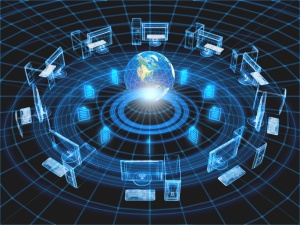An assumption that Globalization is westernization and westernization is globalization thus globalization is Americanization has pervasively struck modern human psyche. This assumption originated with the transnational business and industries, the rise out of pop culture, Hollywood, McDonalds, Coca Cola and other cultural transformation that America has commenced. The concept of nation state with corporate business and civil society organizations favoring the politics and institutions over the world brought the era of ‘American Century’, which stood synonymously to Globalization. Since Globalization was defined by Susan Strange as “anything from the Internet to a hamburger.
All too often, it is a polite euphemism for the continuing Americanization of consumer tastes and cultural practices” (41), it further strengthened the Americanization as Globalization. On the other hand, recent rise of Glocalization over Europe and Asian countries like China and Hong Kong have fostered the idea of isomorphism, which establishes the nebulousrelation between Globalization and Americanization leading to the rejection of the pre-established assumption that Globalization is Americanization.
Charles Lemert and et al (Editors of Globalization: a reader ) in introductory article ‘Mapping Globalization’ have defined globalization prioritizing the transnational flow with rapid expansion, that “…globalization is an idea whose time has come, shedding light as it does on the rapidly expanding scale, speed, magnitude and impact of transcontinental flows and inter-regional patterns of social interaction” (xxi).
Since the America was having the lead over the military and economic eminence, it had tried to establish the new global order along with the emergence of globalization with ‘the age of discovery and economic colonization in the long sixteen century’. Whereas, now globalization is further defined as multidimensional because it is “shaped by, and reshaping, complex forces of economic trade, state organization, and political ideologies”. Similarly, the rise of modern technologies and “interwoven with the emergence of multiple modernities” have been the part of globalization which is led by or have differentiated the western part especially United States of America (XXI).
With the definition of globalization, defined by Charles Lemert and et all, as “the emergence of a borderless world”, it, by definition, is mentioned to be “the westernization, or Americanization, of the world” which “leads to the creolization or hybridization of cultures”. It noticeably headed to the “production of empire and new mechanisms of multilateral control and surveillance” which was predominantly American which brought the notion of “the highest stage of advanced, or multinational, capitalism” (xxiii).
In the like manner, with the pervasively dominant notion of Americanization, a conservative American think tank with “The project for the New American Century (1997-2006)” founded by William kristol and Robert kagan made the significant attempt to bring and promote “American Global Leadership”.
Having defined their “statements of principles”, they argued that “The United States is the leading world power and should maintain that position through the rebuilding of the US military as a key instrument of international order” (246). This think tank comprised up of former US vice president Dick Cheney and former US Secretary of Defense Robert Rumsfeld who referred and influenced the administration of former US president George W. Bush and even the Ronald Reagan.
Besides those powerfully noticeable administrations of Bush and Reagan in terms of military success to establish the new American order and accept the Global American responsibilities, this organized think tank further opined,
Of course, the United States must be prudent in how it exercises its power. But we can’t safely avoid the responsibilities of global leadership or the costs that are associated with its exercise. America has the vital role in maintaining the peace and security in Europe, Asia and Middle East. If we shirk our responsibilities, we invite challenges to our fundamental interests (246).
At the same time, pointing to the invalidity of Reaganite policy of military strength and moral clarity in today, they tried to remind today’s America and have certain consequences to establish and carry on their Global Leadership with the New American Order. They prioritized to “increase defense spending significantly” and modernize their armed forces for future; while strengthening their ties with democratic allies, they “challenge regimes hostile to our interests and values”. Ultimately while promoting the cause of political and economic freedom abroad; they realized to “accept responsibilities for America’s unique role in preserving and extending an international order” which is friendly to security, prosperity and their principles (247).
Furthermore to American global power and order, Ruth Oldenzie argues on his article “Is Globalization a code word for Americanization?: Contemplating McDonalds, Coca-Cola, and military bases” that “Recently, anti-globalists portray globalization as an American neo-liberal project, accusing US-based multinational corporations to have severely magnified the trade conflicts and job insecurity, exploited indigenous resources, and threatened local culture” (84-85).
Establishing McDonald and Coca-Cola as the quintessential symbols of America Oldenzie further claims the existence of American-led globalization where America’s acts of “corporations of selling standardized products, pushing homogenization, and creating false consciousness to the detriment of local communities, the working class and the poor” has always favored them to begin Americanization (85).
On the other hand, Globalization or Americanization has been experienced differently. They have understood the pervasive yet oppressive notion of Americanization under the name of westernization and Globalization. With that wake up call, Asia, Middle East and other parts of the world have challenged and reversed the new global order and leadership as established by The United States of America. With the rise of economy, trade and industries, Asian countries like China, Hong Kong, India and other have stood as the counterpart to American economy.
Doug Guthrie in his article “Globalizing China: China and Globalization” clearly argues that china has risen with “the economic and cultural changes happening in China” which have brought “global involvement” and “a gradual process of democratization.” (331). Guthrie acknowledging China as the fastest growing economy within twenty-five years, mentions, “It is no longer a question of whether China is going to play a major role in world economics and political arena; it is only a question of what role China will play…” (331).
Along with China’s role as a political force on the world stage, he writes about the reasons behind such an economic reform. Firstly, he talks about radical changes. Secondly, he claims mentioning state-led reform, “China’s reform not only show that states can be effective in this process, they s uggest that state-led developments may be far superior to letting the market work its magic” (332). Another reason he mentions for the reform challenging the western reform and development, which is democratization.
uggest that state-led developments may be far superior to letting the market work its magic” (332). Another reason he mentions for the reform challenging the western reform and development, which is democratization.
While talking about democratization, he asserts, “China will become a democracy because that is the agenda some of the key powerful leaders in China have had over the course of the economic reforms. Finally, he articulates yet another reason that is globalization. In this course, Americanization as globalization is precisely defended with his argument saying, “Chinese leaders have leveraged the process of global integration to transform China from within” (332). Ultimately, China and its transform within it have brought certain roles whether it is political or economic to grow and transform.
In the similar fashion, Timothy Garton Ash asserts Europe to play its essential role defining broader global landscape in the World in his article “Europe as Not-America: The Battle for New Europe”. In this article, writer brings about claims which prove that Europe not as the America. Garton Ash makes the bold statement “What Habermas argues with philosophical density, and Strauss- Kahn with eloquent political hyperbole, is that the Europe is different from United States” (334).
He has enlisted several features, claiming, “Europe is, on the whole, better than the United States, and that a European identity can and should be built upon these differences…” (334). He has clearly mentioned that these differences can make Europe to stand out from the United States. Some of them are “Solidarity and social justice, the welfare state, secularism, no death penalty, the environment and international law, peaceful solutions and multilateralism, transcending sovereignty…” (334).
Similarly, Garton Ash picks on the point made by dialectician of German foreign policy, Egon Bahr that “there are two wests which are European west and American west”. Then standing upon these differences, Garton Ash further asserts his point with the idea of American writer Robert Kagan that, “American still operate in “an Anarchic Hobbesian World” where individual nations have to use military might, where Europeans are moving on to a world “of laws and rules and transnational negotiation … a post historical paradise of piece and relative prosperity, the realization of Immanuel Kant’s ‘perpetual peace’” (334).
Along with the idea of Kantian peace, we can no longer deny the fact of European realization of “law based transnational community of peaceful cooperation”. Since the Europe came over the terrible history of competing nation state for the aspiration to their mastery, Europe offered “global antidote” with the clear-cut example of European nation to come over these differences in nation state. Garton Ash says that “that model is now ripe for export.” He further claims that “it exercises a benign magne diplomat confesses that his ultimate ideal would be “the Europeanization of the World” (335).
To conclude that notwithstanding euphemisms for Americanization, the rise of European nation and Asian nations especially China and Hong Kong have subverted the idea of global power. These countries have maintained certain global power and roles for world politics that no longer supported the idea like American century rather they commenced the move for global economy and politics. With their global movement in terms of economy and politics, previously established assumption that advocated Americanization to be Globalization has been rejected and subverted.
Some content on this page was disabled on February 25, 2016 as a result of a DMCA takedown notice from Ben Heine. You can learn more about the DMCA here:



